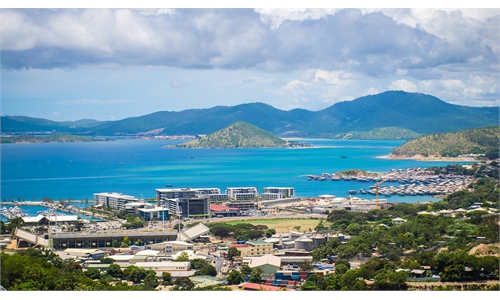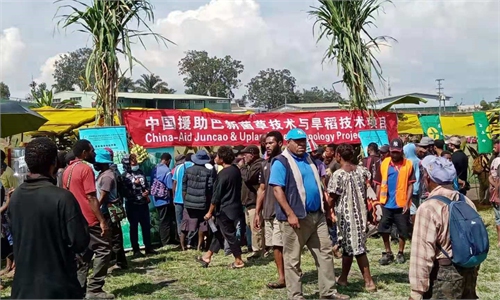Is 'win-win' or 'zero-sum' the main global philosophy of international relations? The example of Papua New Guinea

Illustration: Liu Rui/Global Times
Is "win-win" or "zero-sum" the main global philosophy of international relations?Westerners would say that "zero-sum" is the way the world works. This is the philosophy of "I win, you lose" - or "win-lose" - and it has a deep root in Western history. Think of the doctrine of election or the "chosen people": one group is chosen by God and the rest can go to hell. Through 500 years of Western imperialism and colonialism, this is how the West has treated the rest of the world.
My sense is that the West is in the minority on this question. Western countries comprise only a small portion of the world's population, and so their "win-lose" philosophy is also in the minority. This brings us to "win-win," which is a core principle of China's foreign policy. As we know, "win-win" arises from China's long cultural tradition.
So we have two philosophies competing - paradoxically - on the world stage. Thus far, it seems to be China vs the West, but we need to ask: do other countries have versions of "win-win"? And how do they deal with the West's "win-lose" approach?
They are many possible examples, but let us focus on Papua New Guinea (PNG), since it is increasingly important in Pacific and Southeast Asian relations. PNG's foreign policy follows the principle of "friends to all and enemies to none." PNG is not alone: the Solomon Islands has the same policy, as do other Pacific countries.
However, PNG often finds that it is caught between both approaches: it has more in common with China, but it also must deal with the West. To see how, let us consider PNG-China relations and PNG-Australia relations.
In November 2018, Chinese President Xi Jinping made an official visit to PNG ahead of the APEC leader's forum. Earlier in 2018, PNG's prime minister had signed onto the Belt and Road Initiative, and President Xi's visit to PNG marked a significant enhancement of China-PNG relations. As the "Post-Courier" newspaper noted, PNG had achieved a "win-win" outcome with the visit. The paper stressed Xi's "wise parting message," who said that we should not expect one development model to fit all developing countries, since the latter should have more say on their development path of choice.
In June 2022, then Chinese Foreign Minister Wang Yi visited PNG. Again, many agreements were signed and China's economic partnership with PNG was producing results all the way from the state electricity grid to medical facilities. When welcoming Wang Yi, Prime Minister James Marape stressed PNG's "friends to all and enemies to none" foreign policy. Marape also said that the China-PNG relationship is "as solid and strong as ever," and that it "cannot be compromised or sabotaged."
By contrast, PNG-Australia relations are very different. For 60 years (1914-1975), PNG was a colony of Australia, and for the 48 years since independence PNG has been treated very poorly. Reading through the PNG newspaper articles, one comes across a long list of grievances: a lack of recognition of the assistance from PNG soldiers and villagers to Australian troops during the struggle against Japan; "boomerang aid," or "aid" that benefits Australia and not PNG; the Australian bans on PNG agricultural products and on issuing visas to PNG citizens; and so on.
Clearly, "friends to all and enemies to none" is much more of a challenge for PNG in relation to Australia, since many in PNG struggle to see Australia as a "friend."
It was therefore not easy for the Australian Prime Minister, Anthony Albanese, to visit PNG in January 2023. Many were the grievances to be addressed and the discussions were difficult. At the joint press conference after the meetings, there was much "feel-good" talk about "friendship." Yet, commentators noted that Australia emphasised a postponed "security" agreement, while PNG stressed economic development. A PNG newspaper observed, "Our most immediate need is to fix our economy, feed ourselves, and live quiet secure lives."
However, the Australian media tried to frame Albanese's visit in terms of "zero-sum." At the press conference, Marape was asked: what does the security agreement mean for PNG-China relations? Marape answered that these issues "were not before us." The PNG-China relationship remains the PNG-China relationship, he said. As for Australia, the relation is "particularly unique," so there was no need to bring "China or any other nation into the picture." In other words, we will deal with each country in our own way.
The hapless Australian media (and not a few of the ruling elite) were puzzled, since this answer did not suit their "win-lose" worldview - no matter how hard they tried to make it fit.
To return to my initial question: it seems that versions of "win-win" are more common in the world than "win-lose." We would need to consider more examples beyond PNG and the Pacific to confirm this conclusion, but the Pacific is a good start.
So what should be done about Western countries like Australia and their "zero-sum" philosophy? Given the deep cultural roots, it will take many lessons to unlearn this destructive philosophy. But perhaps they could begin with more time in PNG, and other Pacific countries, so as to learn more about "friends to all and enemies to none," and "win-win."
The author is a Marxist scholar from Australia, distinguished overseas professor at Renmin University of China, and on editorial board of the Australian Marxist Review. opinion@globaltimes.com.cn



